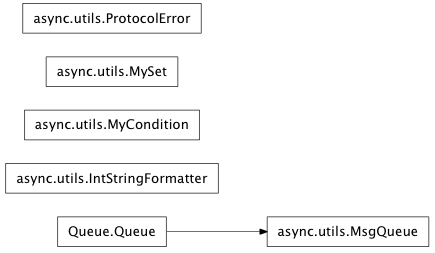mmf.async.utils¶
| IFormatter() | |
| ProtocolError | Malformed message. |
| MySet(*v, **kw) | A set-like object that allows for unhashable entries. |
| MyCondition([lock, verbose]) | |
| IntStringFormatter | Formatter for messages of the format “%i.%s”(len(msg),msg) |
| MsgQueue([maxsize]) | Implements a threadsafe message queue that allows you to add data and then yields parsed and complete messages. |
| hasargs(decorator) | Meta-decorator to allow a decorator to accept kwargs or no arg (but use the default values). |
Inheritance diagram for mmf.async.utils:

Some useful non-twisted dependent utilities.
- interface mmf.async.utils.IFormatter[source]¶
Bases: zope.interface.Interface
- class mmf.async.utils.ProtocolError[source]¶
Bases: exceptions.Exception
Malformed message.
- __init__()¶
x.__init__(...) initializes x; see help(type(x)) for signature
- class mmf.async.utils.MySet(*v, **kw)[source]¶
Bases: list
A set-like object that allows for unhashable entries.
Methods
add(item) append L.append(object) – append object to end count L.count(value) -> integer – return number of occurrences of value extend L.extend(iterable) – extend list by appending elements from the iterable index L.index(value, [start, [stop]]) -> integer – return first index of value. insert L.insert(index, object) – insert object before index pop L.pop([index]) -> item – remove and return item at index (default last). remove(item[, throw]) reverse L.reverse() – reverse IN PLACE sort L.sort(cmp=None, key=None, reverse=False) – stable sort IN PLACE; update(iterable)
- class mmf.async.utils.MyCondition(lock=None, verbose=None)[source]¶
Bases: threading._Condition
Methods
notify([n]) notifyAll() notify_all() wait([timeout]) Like regular wait, but raises and exception upon timeout. - __init__(lock=None, verbose=None)¶
- class mmf.async.utils.IntStringFormatter[source]¶
Bases: object
Formatter for messages of the format “%i.%s”(len(msg),msg)
>>> F = IntStringFormatter >>> msg = F.format("Hello") >>> msg '5.Hello' >>> F.split(msg) ('Hello', '') >>> F.split("2.Hi5.There") ('Hi', '5.There')
Invalid messages will raise a ProtocolError >>> F.split(“1j.Hello”) Traceback (most recent call last):
...ProtocolError: Received non-digit ‘j’ in message prefix ‘1j’
- __init__()¶
x.__init__(...) initializes x; see help(type(x)) for signature
- class mmf.async.utils.MsgQueue(maxsize=0)[source]¶
Bases: Queue.Queue
Implements a threadsafe message queue that allows you to add data and then yields parsed and complete messages.
Methods
Formatter empty() Return True if the queue is empty, False otherwise (not reliable!). full() Return True if the queue is full, False otherwise (not reliable!). get([block, timeout]) Remove and return an item from the queue. get_nowait() Remove and return an item from the queue without blocking. join() Blocks until all items in the Queue have been gotten and processed. put(item[, block, timeout]) Put an item into the queue. put_nowait(item) Put an item into the queue without blocking. qsize() Return the approximate size of the queue (not reliable!). task_done() Indicate that a formerly enqueued task is complete. - Formatter¶
alias of IntStringFormatter
- mmf.async.utils.hasargs(decorator)[source]¶
Meta-decorator to allow a decorator to accept kwargs or no arg (but use the default values). Also applies wraps.
>>> @hasargs ... def decorator_with_args(f, m=2, b=1): ... return lambda x: m*f(x) + b >>> @decorator_with_args ... def f(x): return x**2 >>> f(2.0) 9.0 >>> @decorator_with_args(m=3, b=2) ... def f(x): return x**2 >>> f(2.0) 14.0